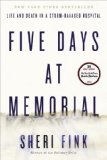Summary | Excerpt | Reviews | Beyond the Book | Readalikes | Genres & Themes | Author Bio

Critics' Opinion:
Readers' Opinion:
First Published:
Sep 2013, 432 pages
Paperback:
Jan 2016, 592 pages
 Book Reviewed by:
Book Reviewed by:
Rory L. Aronsky
Buy This Book
Thiele knew nothing about the dozen or so patients who remained, but they made an impression on him. Before the storm, the poor souls would have had a chance. Now, with the compounding effects of days in the inferno with little to no medications or fluids, they had deteriorated.
The airboats outside made it too loud for Thiele to use a stethoscope. He didn't see any medical records, he didn't feel he needed them to tell him that these patients were moribund. He watched a doctor he didn't know direct their care, a short woman with auburn hair. He would later learn her name: Dr. Anna Pou, a head and neck surgeon
Pou was among the few doctors still caring for patients inside the stifling hospital. Some physicians had departed; those who hadn't were, for the most part, no longer practicing medicine—they had assumed the roles of patient transporters or were overseeing the evacuations outside where it was somewhat cooler. But Pou looked to Thiele like a female Lone Ranger. After enduring four stressful days and four nights of little sleep, she retained the strength and determination to tend to the worst-off. Later, he would remember her saying that the patients before them would not be moved from the hospital. He did not know if she had decided that, or if she had been told that by an administrator.
Hospital CEO L. René Goux had told Thiele that everyone had to be out by nightfall. A nursing director, Susan Mulderick, the designated disaster manager, had given Thiele the same message. The two leaders later said they had meant to focus their exhausted colleagues on the evacuation, but the comments left Thiele wondering what would become of these patients when everyone else left.
He also wondered about the remaining pets, which he'd heard would be released from their kennels to fend for themselves. They were hungry. And Thiele was sure that another kind of "animal" was poised to rampage through the hospital looking for drugs. He later recalled wondering at the time: "What would they do, these crazy black people who think they've been oppressed for all these years by white people . . . God knows what these crazy people outside are going to do to these poor patients who are dying. They can dismember them, they can rape them, they can torture them."
What would a family member of a patient want Thiele to do? There was no one left to ask; they had all been made to leave, told their loved ones were on their way to rescue.
The first thing, he thought, was the Golden Rule, do unto others as you would have them do unto to you. Thiele was Catholic and had been influenced by a Jesuit priest, Father Harry Tompson, a mentor who had taught him how to live and treat people. Thiele had also adopted a motto he had learned in medical school: "Heal Frequently, Cure Sometimes, Comfort Always." It seemed obvious what he had to do, robbed of almost any control of the situation except the ability to offer comfort.
This would be no ordinary comfort, not the palliative care he had learned about in a week-long course that certified him to teach the practice of relieving symptoms in patients who had decided to prioritize this goal of treatment above all others.
There were syringes and morphine and nurses in this makeshift unit on the second-floor lobby. An intensive care nurse he had known for years, Cheri Landry, the "Queen of the Night Shift"—a short, broad-faced woman of Cajun extraction who had been born at the hospital—had, he believed, brought medications down from the ICU. Thiele knew why these medications were here. He agreed with what was happening. Others didn't. The young internist who had helped him euthanize the cat refused to take part. He told her not to worry. He and others would take care of it.
In the days since the storm, New Orleans had become an irrational and uncivil environment. It seemed to Thiele the laws of man and the normal standards of medicine no longer applied. He had no time to provide what he considered appropriate end-of-life care. He accepted the premise that the patients could not be moved and the staff had to go. He could not justify hanging a morphine drip and praying it didn't run out after everyone left and before the patient died, following an interval of acute suffering. He could rationalize what he was about to do as merely abbreviating a normal process of comfort care—cutting corners—but he knew that it was technically a crime. It didn't occur to him then to stay with the patients until they died naturally. That would have meant, he later said he believed, risking his life.
Excerpted from Five Days at Memorial by Sheri Fink. Copyright © 2013 by Sheri Fink. Excerpted by permission of Crown. All rights reserved. No part of this excerpt may be reproduced or reprinted without permission in writing from the publisher.





The House on Biscayne Bay
by Chanel Cleeton
As death stalks a gothic mansion in Miami, the lives of two women intertwine as the past and present collide.

The Flower Sisters
by Michelle Collins Anderson
From the new Fannie Flagg of the Ozarks, a richly-woven story of family, forgiveness, and reinvention.

The Funeral Cryer by Wenyan Lu
Debut novelist Wenyan Lu brings us this witty yet profound story about one woman's midlife reawakening in contemporary rural China.
Your guide toexceptional books
BookBrowse seeks out and recommends the best in contemporary fiction and nonfiction—books that not only engage and entertain but also deepen our understanding of ourselves and the world around us.